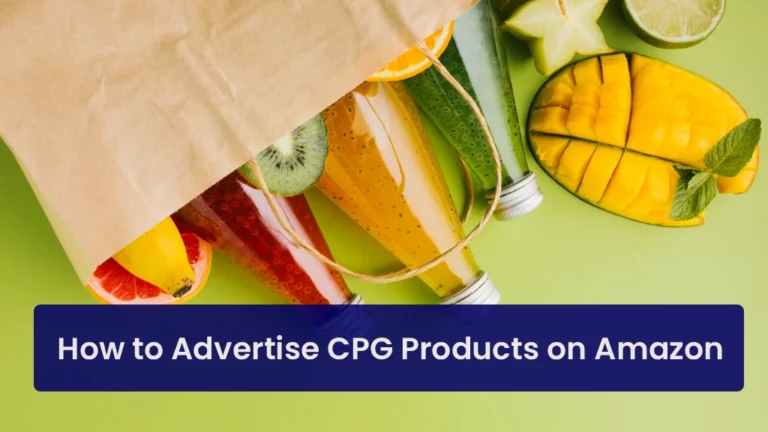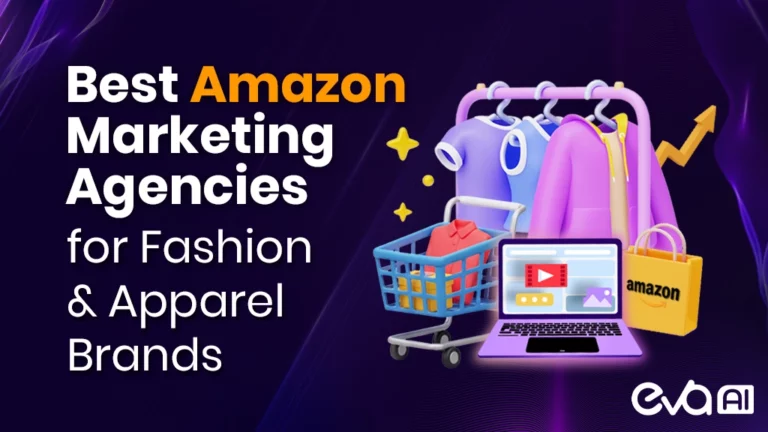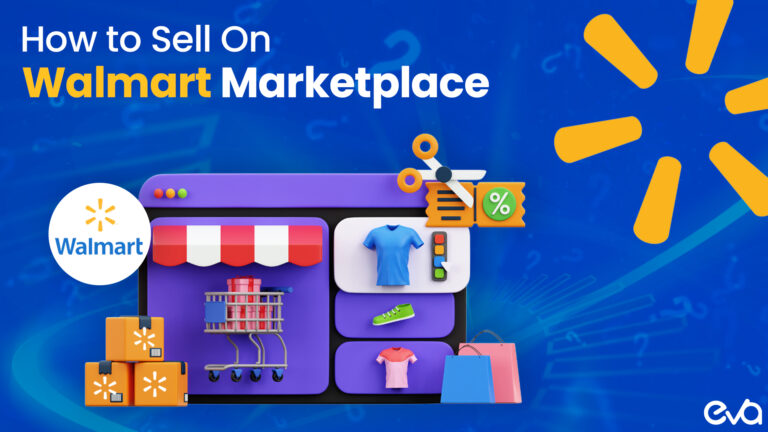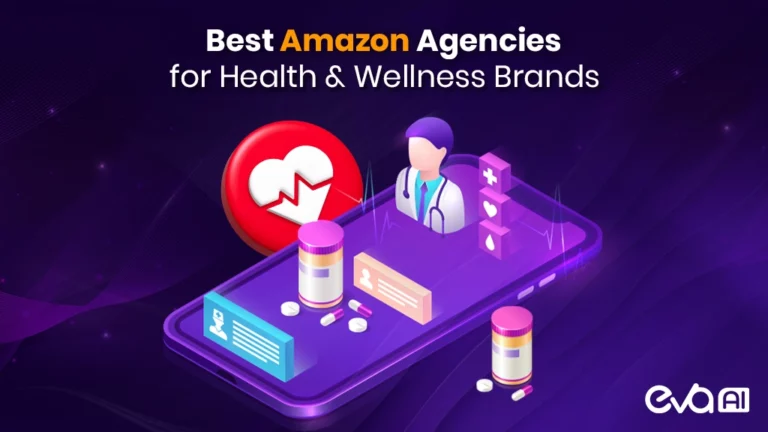You’ve probably seen those banner ads with brand names and lots of products at the top of Amazon search results. Those are Amazon Sponsored Brand ads, and if you know how to use them, they can really help you sell more.
Most sellers don’t bother with these ads because they think they’re hard to set up. However, it only takes thirty 30 to make your first campaign. They are less competitive than standard product ads because you need Brand Registry to run them.
This article tells you how to make ads that make money, pick the right keywords, and keep track of what’s working.
Table of Contents
- What Are Amazon Sponsored Brands Ads?
- Who Can Use Amazon Sponsored Brands Ads and What Are the Requirements?
- What Are the 3 Types of Sponsored Brands Formats?
- How Much Do Amazon Sponsored Brands Ads Cost?
- How to Register for Amazon Sponsored Brand Ads؟
- How to Set Up Your First Sponsored Brands Campaign: Step-by-Step Guide
- How To Track Success For Amazon Sponsored Brands Ads
- Amazon Sponsored Brands Ads Tools [Free And Paid]
- FAQs
What Are Amazon Sponsored Brands Ads?
We were all looking for something on Amazon when all of a sudden, there was this nice-looking ad at the top with a brand name and a few products. We call those ads “Amazon Sponsored Brands.”
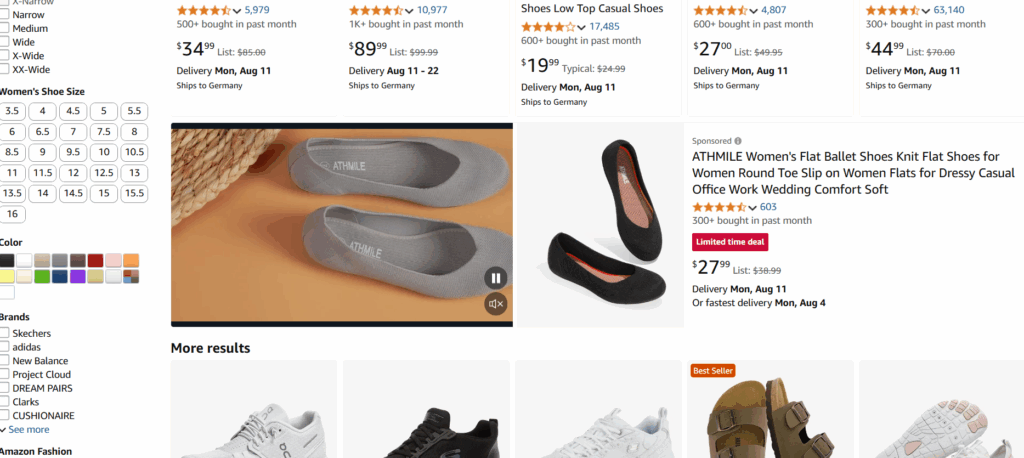
They’re effectively Amazon’s way of guaranteeing that brands get special treatment and don’t end up on page two. And to be honest, they work pretty well.
Amazon Sponsored Brand ads let us show off our whole brand, not just one product. It’s like the difference between showing someone your business card versus just pointing at your shoe.
Here are some cool things we get:
- It needs to be 400×400 pixels and have our logo at the top.
- A title that is exactly 50 characters long (every letter counts)
- Display up to three items at once
- Anyone can click here and go to any site we choose.
- You can make your own pictures if you want to (1200×628 pixels is best).
We manage what happens after someone clicks on our logo or story. Send them to our store? Our landing page? We’re the boss here. About 25% more people buy something when they visit a brand store compared to just landing on a product page.
Where We’ll See Amazon Sponsored Brands Ads
Let’s say we’re searching for a cooker. Bella shows up at the top with their logo, “Perfect Cooking” as the headline, and three different cookers. That’s it working, and it’s getting prime real estate.
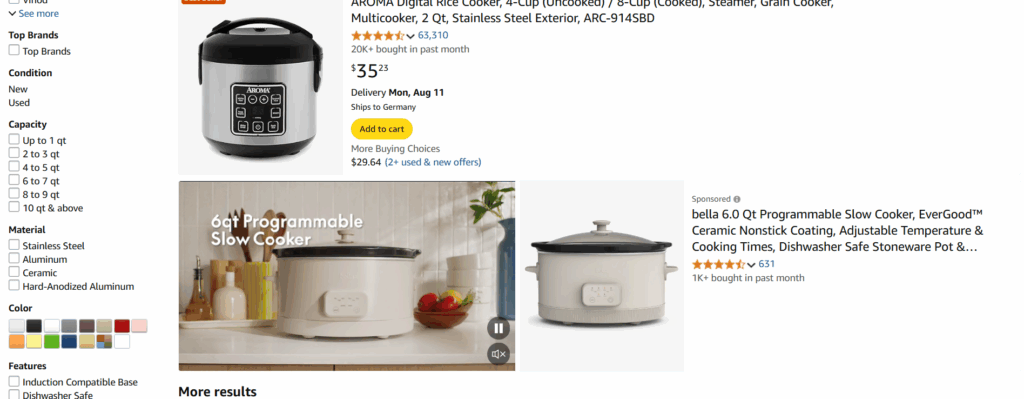
These ads pop up:
- At the top of search results (the golden spot where 65% of people look first)
- Sometimes in the middle of the results
- End of the page once in a while
- On product pages (the video ones especially)
Video ads are pretty cool. They play without sound, last 6-45 seconds, and show up where Amazon thinks people will watch them. The catch? We need the video to be in MP4 or MOV format and under 500MB.
Amazon Sponsored Brands Ads Vs Other Amazon Ads
Amazon has three main ad types. Here’s the simple breakdown:
| What It Does | Sponsored Products | Sponsored Brands | Sponsored Display |
| Goal | Sell one thing fast | Show off our brand | Get people back |
| Where | Mixed in search results | Top spots, prime location | All over Amazon and beyond |
| Look | Just a product photo | Logo, headline, custom everything | Custom images and targeting |
| Who Can Use | Most sellers | Need brand registry | Most sellers |
| How Many Products | One lonely product | Up to 3 products | Depends on strategy |
| Where Clicks Go | Product page only | We choose a destination | Product page or store |
| Typical Cost | $0.50-$2.00 per click | $0.75-$3.00 per click | $0.30-$1.50 per click |
Amazon Sponsored Products ads sell stuff right now, but Amazon Sponsored Brands get people to remember us for later. Both are good, just different jobs.
Who Can Use Amazon Sponsored Brands Ads and What Are the Requirements?
Sponsored Brands ads aren’t available to everyone. In fact, you have to follow some rules at first on Amazon, but they’re not too hard to understand once you do.
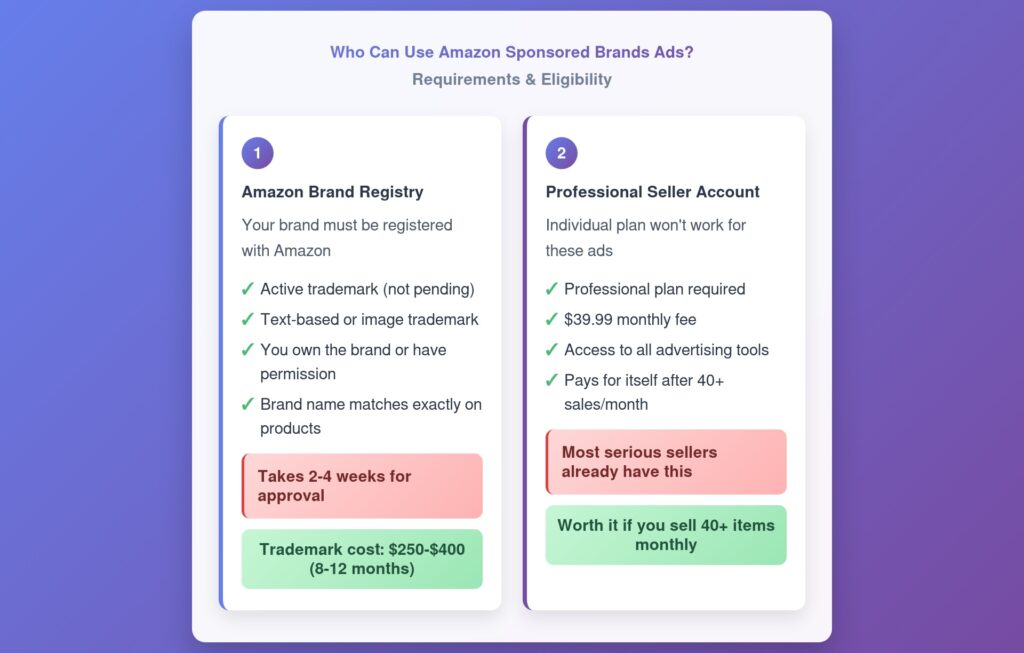
Basically, Amazon Brand Registry is what you need in the first step.
1- Those With Amazon Brand Registry
It’s Amazon’s way of saying, “prove this brand is really yours.” Amazon won’t let you sign up unless you have a trademark for your brand name.
What you need is this:
- A brand that has been filed (not just suggested; it has to be accepted)
- It must be either text-based or image-based, with words on it.
- You must own the name or have permission to use it.
- Your product’s brand name must exactly match the logo.
Once you send everything in, the whole process takes 2 to 4 weeks. Amazon looks at your name to make sure you own it, and then they give you access to brand tools like Sponsored Brands ads.
You should get a title first if you don’t already have one. That takes 8 to 12 months in the US and costs between $250 and $400 through the USPTO.
2- Professional Seller Account Owner
You also need a Professional selling plan on Amazon since the Individual plan won’t work here.
Professional plans cost $39.99 per month, but you get access to all the advertising tools.
However, if you’re serious about selling on Amazon, you probably already have this. The Professional plan pays for itself pretty quickly once you start selling more than 40 items per month.
Product Requirements by Ad Format
Different ad formats need different requirements:
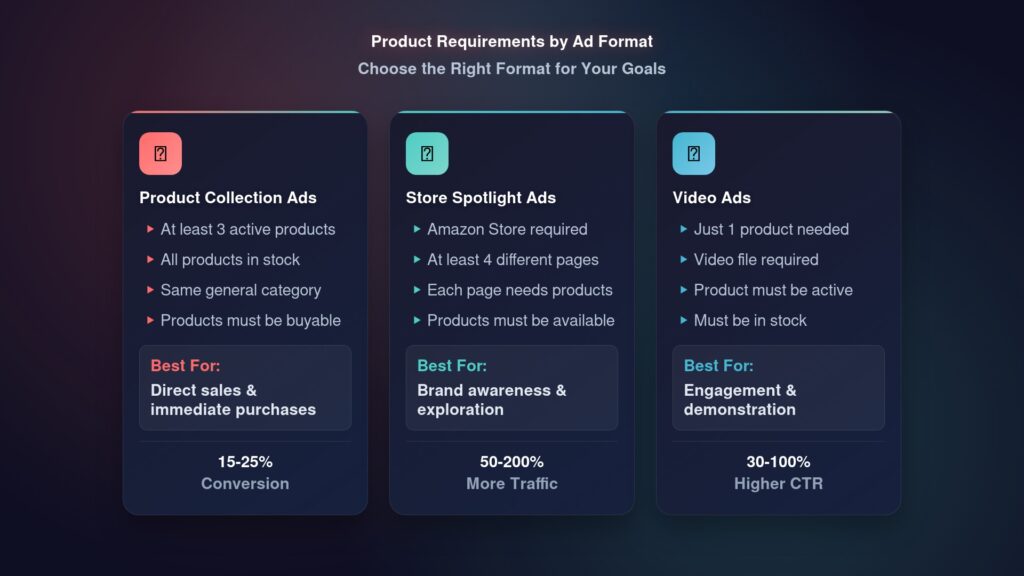
Product Collection Ads:
- At least 3 active products in your catalogue
- Products need to be in stock and buyable
- All products should be in the same general category
Store Spotlight Ads:
- You need an Amazon Store (free to create)
- At least 4 different store pages with unique products on each
- Each page needs at least one product that’s available for purchase
Video Ads:
- Just 1 product (easiest option)
- You need a video file that meets Amazon’s specs
- Product needs to be active and in stock
Which Countries Can Use Amazon Sponsored Brands Ads?
Sponsored Brands ads are available in most countries where Amazon operates:
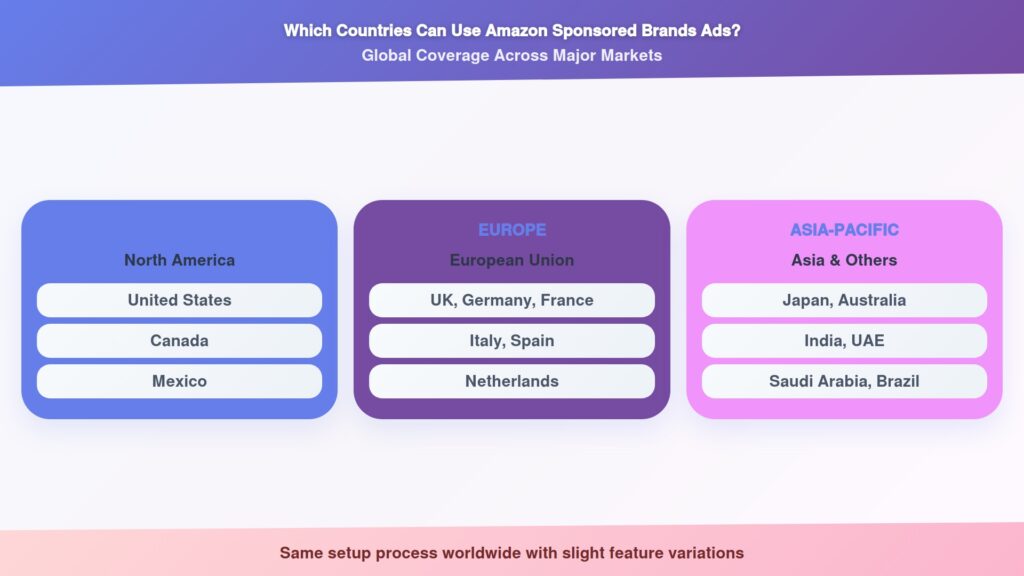
- United States, Canada, Mexico
- United Kingdom, Germany, France, Italy, Spain, Netherlands
- Japan, Australia, India, UAE, Saudi Arabia, Brazil
The features might be slightly different in each country, but the basic setup is the same everywhere.
How to Check if You’re Ready for Amazon Sponsored Brands Ads?
Want to know if these ads are okay for you to use? This is a quick check:
- Go to Seller Central and look for “Advertising” in the main menu
- Click on “Campaign Manager”
- Try to create a new campaign and select “Sponsored Brands”
- The setup page should show up.
- You can find out what’s missing if you get an error message.
Also, in Seller Central, go to “Brands” to see how your Brand Registry is doing. That means your brand is ready for Sponsored Brands if it shows up there as “Active.”
What Are the 3 Types of Sponsored Brands Formats?
Amazon gives you 3 different ways to run Amazon Sponsored Brand ads. Each one works differently and serves different goals.
| Format | Best For | Requirements | Expected Results |
| Product Collection | Direct sales | 3+ products | 15-25% conversion rate |
| Store Spotlight | Brand awareness | 4+ store pages | 50-200% more store traffic |
| Video | Engagement | Video content | 30-100% higher CTR |
If you have never used Amazon Sponsored Brand ads before, start with Product Collection. They are the easiest to set up and give you results quickly.
Once you feel safe and have a product that makes sense to show off, try video ads.
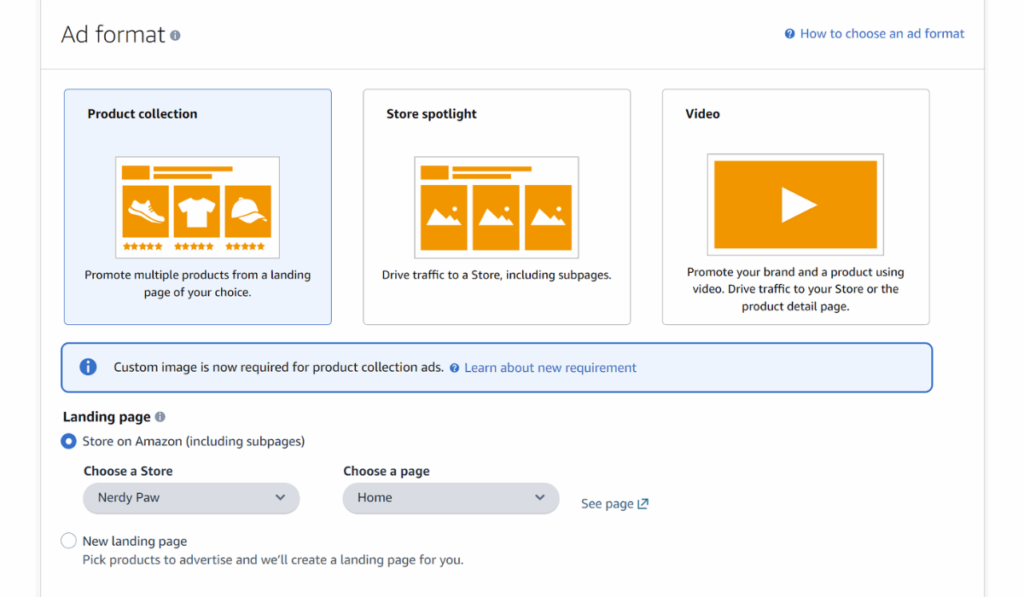
Brands that are well-known and have a lot of products work best with Store Spotlight. You shouldn’t use it unless your store is really great.
1- Product Collection Amazon Sponsored Brands Ads
Banner ads at the top of Amazon’s search results are called Product Collection Ads. You can put up to three items and your brand next to each other.
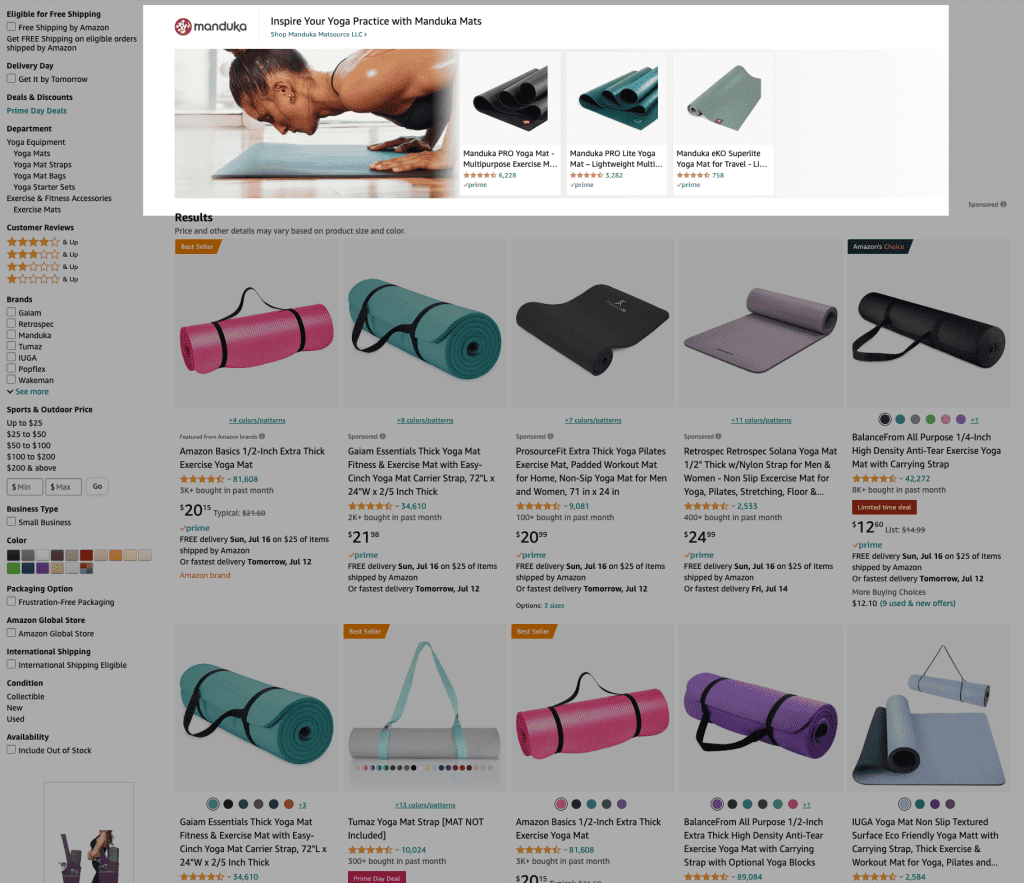
When to Use Product Collection Ads?
These are great for getting consumers to purchase your stuff immediately. This is what they do best:
- Promoting your best-selling items
- Putting out new goods that need lots of attention
- Focusing on people who are ready to buy
- Getting people to visit certain product pages
So if you’re selling pills, group your three best vitamins together. Or pair your newest phone case with your best-selling ones when you first come out with them.
Product Collection Sponsored Ads Setup Requirements
Create these Amazon Sponsored Brand ads with at least three items. Every item should be:
- In stock and ready to ship right now
- From the same category or areas that are similar
- Affordable compared to others in your market
- Have reviews that are good (at least 3.5 stars).
Best Practices For Amazon Product Collection Ads
Use advantages to keep your headline short (less than 50 characters). It works better to say “Comfortable Running Shoes” instead of “Premium Athletic Footwear Collection.”
Choose items that go well with each other. If you sell coffee, show off your travel mug, coffee machine, and coffee beans because it makes people want to buy from you instead of your rivals.
So let’s say you sell items for the kitchen. This is how you make a Product Collection ad:
- Main product: Vegetable chopper ($24.99, 4.3 stars)
- Supporting products: Measuring cups ($12.99, 4.5 stars) and cutting board ($18.99, 4.1 stars)
- Headline: “Make Cooking Easy”
- Target keywords: “kitchen tools,” “cooking gadgets,” “food prep”
2- Store Spotlight Amazon Sponsored Brands Ads
These Amazon Sponsored Brand ads promote your Amazon Store pages instead of individual products. They show your logo, headline, and previews of 3 different store sections.
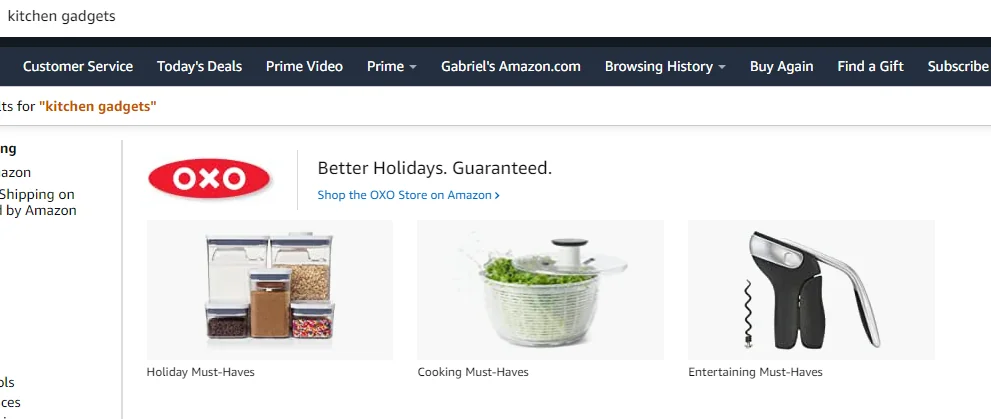
When to Use Store Spotlight Ads?
Choose Store Spotlight Ads when you want to build brand recognition and get people exploring your full product range. They work well for:
- Brands with 15+ different products
- Building long-term customer relationships
- Introducing your brand to new shoppers
- Getting people to browse multiple product categories
Store Spotlight Sponsored Brands Ads Requirements
Your Amazon Store needs:
- At least 4 different pages with unique content
- Each page must have different products (minimum 3 products per page)
- Professional-looking design and layout
- Updated product information and current images
Optimization Tips For Store Spotlight Sponsored Ads
Make your store pages easy to understand and create sections like “Morning Routine,” “Workout Gear,” or “Kitchen Basics” instead of confusing category names. Also, update your store every 2-3 months with new content, seasonal products, and fresh images.
For example, you run a skincare brand with 25 products. You must create store pages for:
- “Daily Skincare” (cleanser, moisturizer, sunscreen)
- “Anti-Aging” (serum, eye cream, night cream)
- “Problem Skin” (acne treatment, oil control, gentle cleanser)
So, your Store Spotlight ad uses the headline “Complete Skincare Solutions” and targets “skincare routine,” “face care,” and “beauty products.”
3- Video Amazon Sponsored Brands Ads
Video Sponsored Ads show a short video of your product in action. The video plays automatically without sound when people scroll past it.
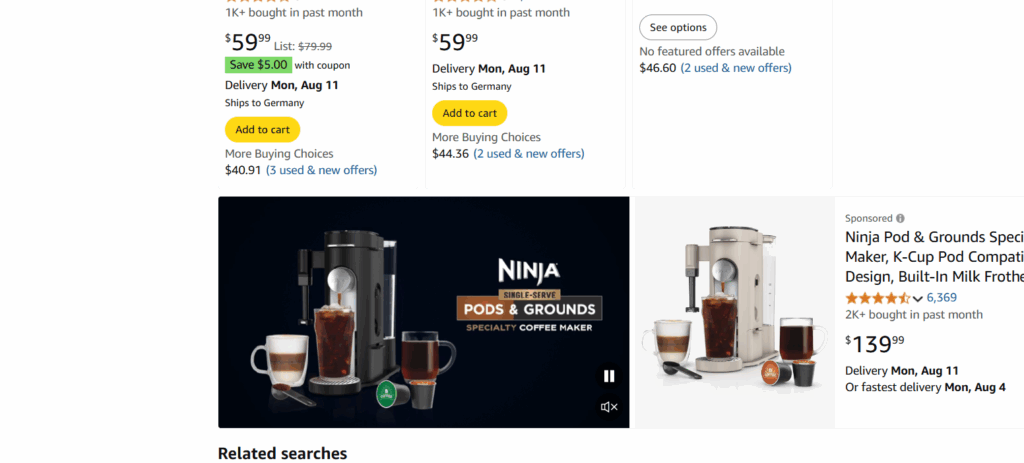
When to Use Video Sponsored Brands Ads?
Video works best when you need to show how your product works or what makes it different, and is perfect for:
- Products that need demonstration
- Complex items that require explanation
- Building an emotional connection with your brand
- Standing out in crowded search results
Video Amazon Ads Requirements
Your video must be:
- 15 to 30 seconds long (sweet spot for attention)
- MP4 or MOV format only
- Under 500MB file size
- 1280×720 pixels minimum (1920×1080 preferred)
- Shows your product clearly within the first 5 seconds
Creative Video Amazon Ads Practices
- Start with your product immediately and show the product being used by real people in normal situations.
- Then, add text overlay since videos play without sound.
- Keep text large enough to read on phones.
- End with a clear call to action like “Shop Now” or “See Details.”
Assume you sell resistance bands for home workouts. Your 25-second video would be like this:
- Seconds 1-5: Person using bands for arm exercises
- Seconds 6-15: Same person doing leg and core exercises
- Seconds 16-20: All 5 resistance bands laid out showing different strengths
- Seconds 21-25: Text overlay “Complete Home Gym” with your logo
Remember to target keywords like “home workout,” “resistance bands,” and “fitness equipment.”
How Much Do Amazon Sponsored Brands Ads Cost?
Sponsored Brand ads on Amazon usually cost between $0.50 and $3.00 per click, but it depends on your area and how much competition there is. Start with a small daily budget of $20 to $30, see what works, and then spend more on ads that are doing well.
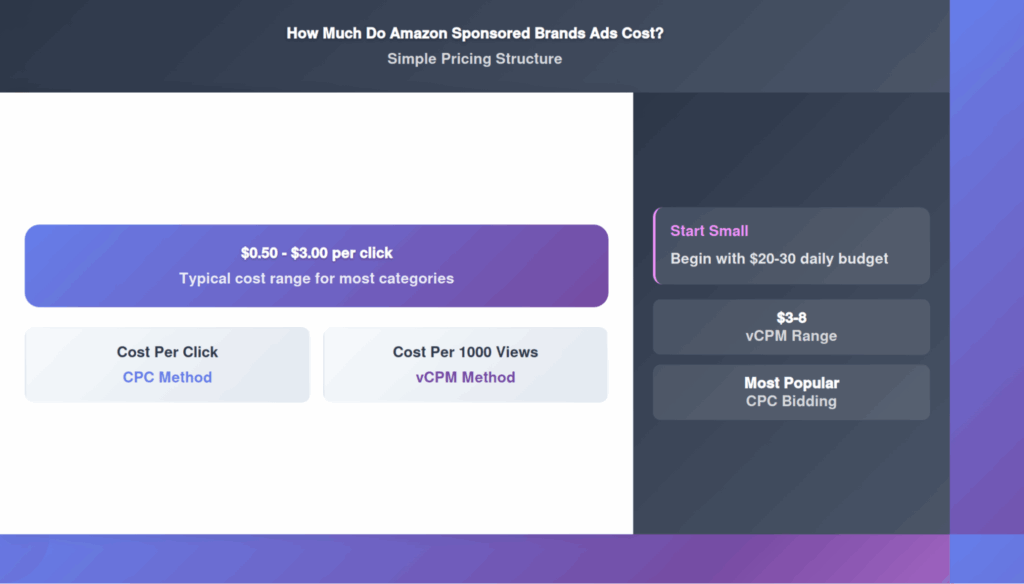
Amazon charges you in two different ways based on the campaign goal you choose.
- Cost Per Click (CPC): You pay every time someone clicks on your ad. Choose a high bid, say $1.50, and Amazon will charge you $0.30 to $1.50, based on how much competition there is. This is what most people do.
- Cost Per 1,000 Views (vCPM): You pay each time 1,000 people see your ad, and it doesn’t matter if they click or not. This is what Amazon uses to get people to know their business, and you can expect to pay $3 to $8 for every 1,000 views.
CPC is where most buyers start because it’s easier to see how much money they’re making.
Here’s what real sellers spend on Amazon Sponsored Brand ads:
| Business Size | Daily Budget | Monthly Spend | CPC Range |
| Small (1-10 products) | $20-50 | $600-1,500 | $0.50-2.00 |
| Medium (11-50 products) | $50-150 | $1,500-4,500 | $0.75-2.50 |
| Large (50+ products) | $150+ | $4,500+ | $1.00-3.00+ |
Amazon Sponsored Brands Ads Cost By Industry
Some categories cost more than others:
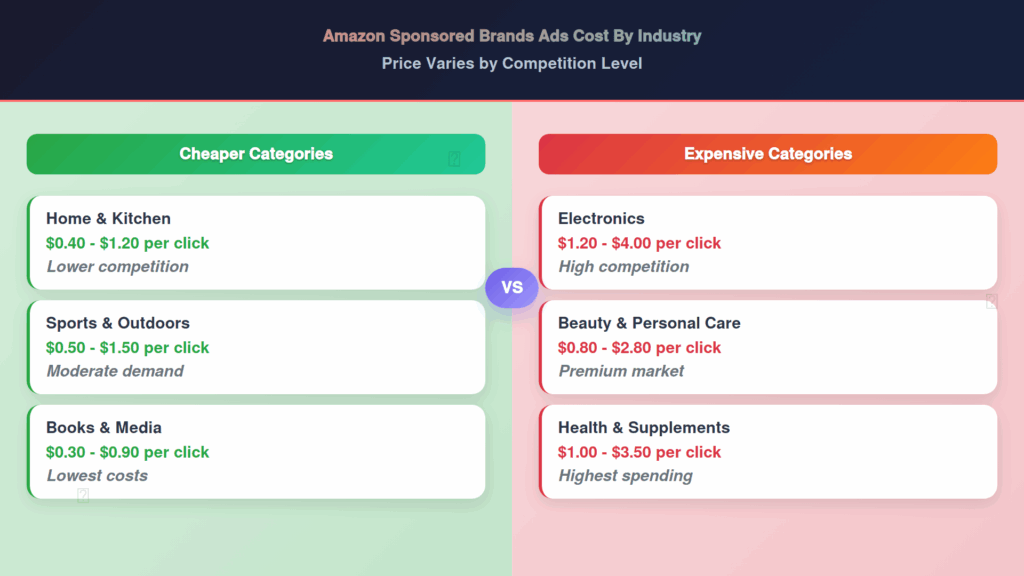
Cheaper Categories
- Home and kitchen: $0.40-1.20 per click
- Sports and outdoors: $0.50-1.50 per click
- Books and media: $0.30-0.90 per click
Expensive Categories
- Electronics: $1.20-4.00 per click
- Beauty and personal care: $0.80-2.80 per click
- Health and supplements: $1.00-3.50 per click
Electronics cost more because there’s a lot of competition, and people spend a lot of money on gadgets.
What Makes Your Brand’s Ads Cost Go Up?
Several things affect how much you pay for clicks.
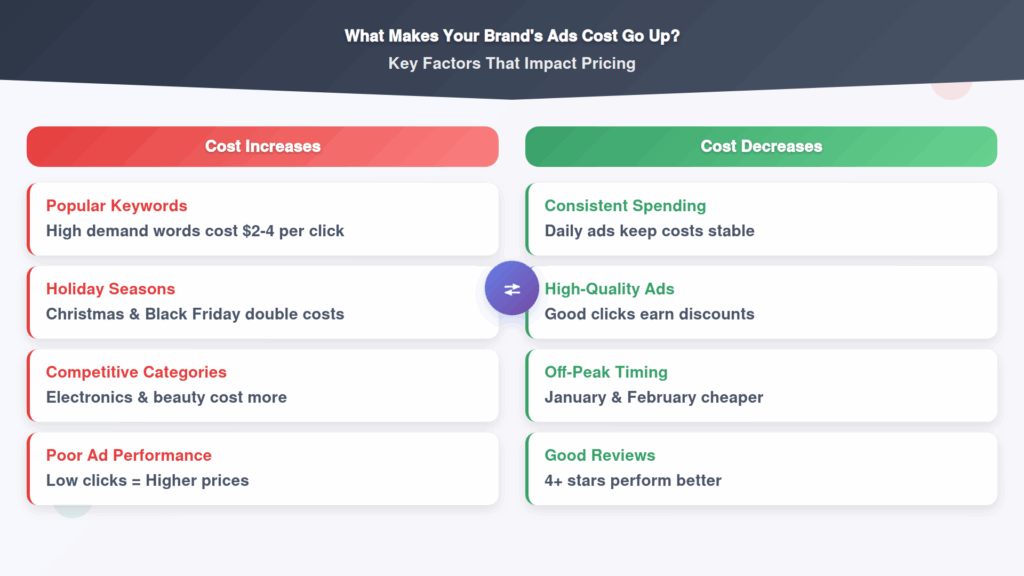
Factors That Make Amazon Ads Costs Higher
- Popular keywords: Words like “wireless headphones” cost $2-4 per click because everyone wants them
- Holiday seasons: Christmas and Black Friday can double your costs
- Competitive categories: Electronics and beauty products always cost more
- Targeting competitor brands: Bidding on “Apple iPhone” when you sell Android cases gets expensive
- Poor ad performance: If people don’t click your ads, Amazon makes you pay more
Things That Lower Your Amazon Ads Costs
- Consistent spending: Running ads every day instead of on and off keeps costs stable
- High-quality ads: Products images and headlines that get clicks earn you discounts
- Off-peak timing: January and February usually have cheaper clicks
- Good product reviews: Items with 4+ stars and lots of reviews perform better and cost less
Real Sponsored Brands Ads Budget Example
For example, you sell kitchen gadgets and want to spend $1,000 per month on Amazon Sponsored Brand ads.
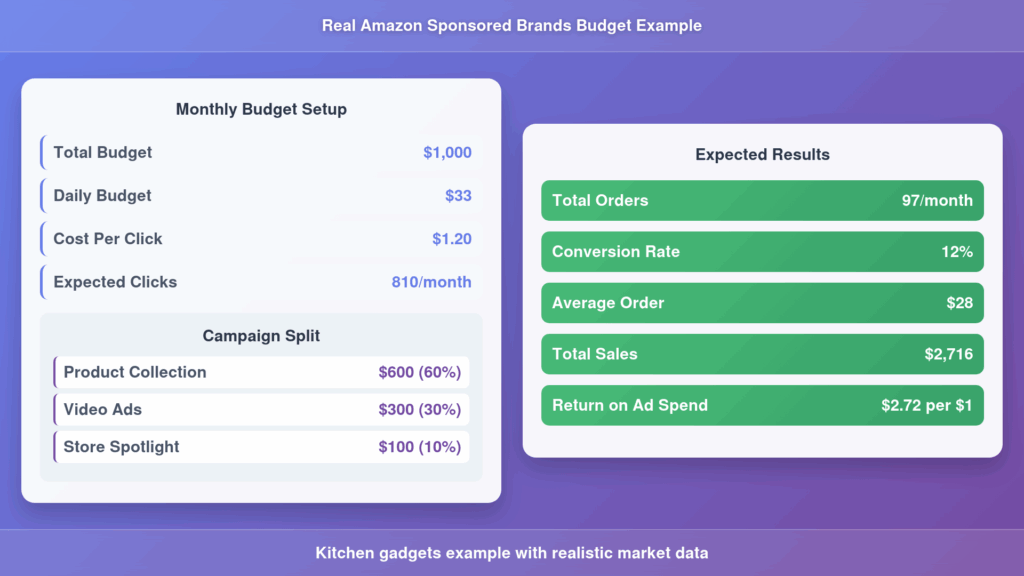
Daily Budget Setup
- Total monthly budget: $1,000
- Daily budget: $33 ($1,000 ÷ 30 days)
- Expected cost per click: $1.20 (kitchen category average)
- Expected daily clicks: 27 clicks ($33 ÷ $1.20)
- Expected monthly clicks: 810 clicks
Campaign Split
- Product Collection ads: $600 (60% of budget) – targets “kitchen tools,” “cooking gadgets”
- Video ads: $300 (30% of budget) – shows your bestselling chopper in action
- Store Spotlight ads: $100 (10% of budget) – drives people to your store
Expected Results
- Total clicks: 810 per month
- Conversion rate: 12% (typical for kitchen products)
- Orders: 97 per month
- Average order value: $28
- Total sales: $2,716
- Return on ad spend: $2.72 for every $1 spent
How to Register for Amazon Sponsored Brand Ads؟
You have to sign up for Amazon advertising before you can make Amazon Sponsored Brand ads. It takes 10 minutes and is free.
Step 1: Register for Amazon Advertising
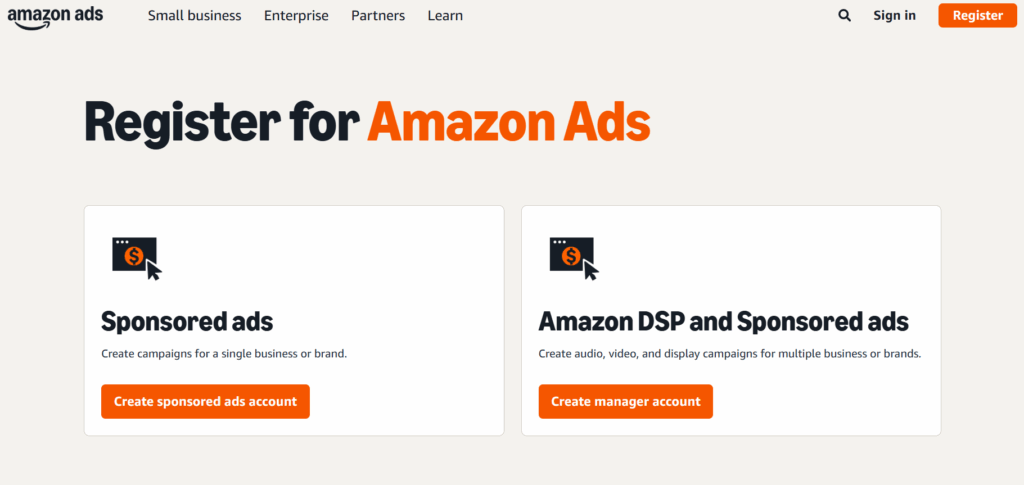
Start by going to the Amazon Sponsored Brands page to learn about the requirements.
Then go to Amazon Advertising Registration to sign up.
You need these things:
- Your Seller Central login details
- Brand Registry approval
- Professional selling plan on Amazon
Sign in with your Amazon seller account. Amazon checks what ad types you can use.
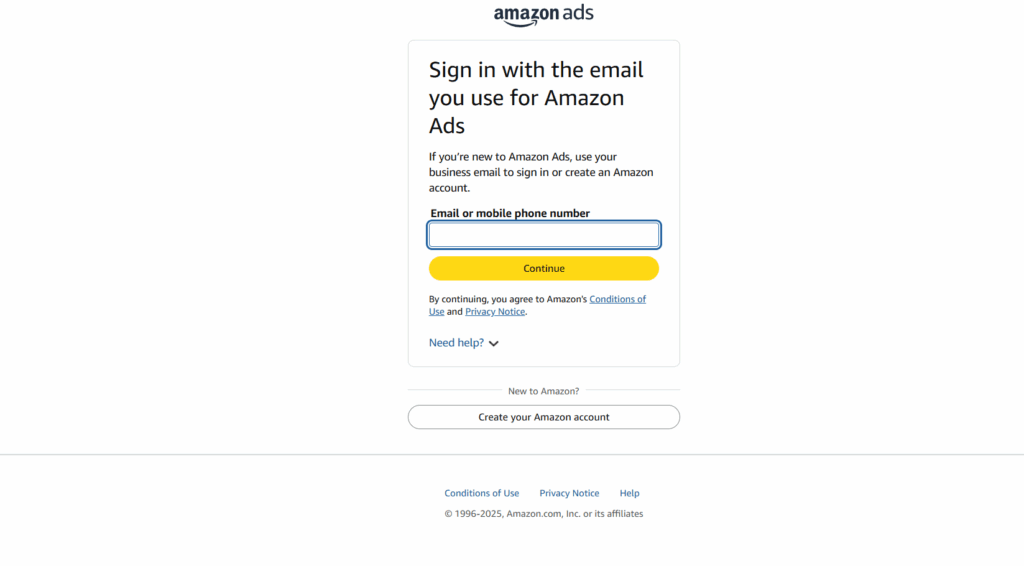
You must have Brand Registry to create Amazon Sponsored Brand ads. No Brand Registry means no Sponsored Brands campaigns.
Step 2: Access Your Advertising Console
Once registered, you have two ways to create ads:
Method 1: Through Seller Central
- Log in to Seller Central
- Click “Advertising” in the main menu
- Select “Campaign Manager“
- Click “Create Campaign“
Method 2: Direct Advertising Console
- Go to advertising.amazon.com
- Sign in with your seller account
- Access your advertising dashboard directly
Step 3: Start Creating Your First Campaign
Click “Create Campaign” and you’ll see three options:
- Sponsored Products
- Sponsored Brands
- Sponsored Display
Pick “Sponsored Brands” to start your Amazon Sponsored Brand ad.
How to Set Up Your First Sponsored Brands Campaign: Step-by-Step Guide
You can make your first Amazon Sponsored Brand ad in 30 minutes. Follow each step carefully so you don’t mess anything up.
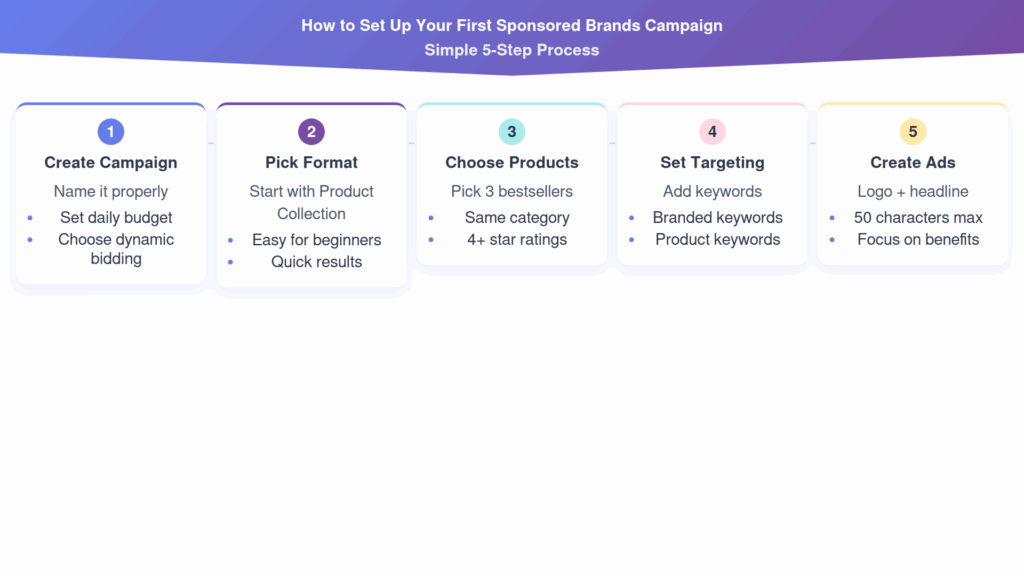
First, go to Amazon Seller Central and log in to your account.
Step 1: Create Your Campaign and Choose Settings
Go to the Advertising section in your main menu. Click “Campaign Manager” then “Create campaign.” Pick “Sponsored Brands” from the list.
Name Your Campaign Properly
Use a clear naming system so you can find your campaigns later. Here’s what works:
Format: [Ad Type] – [Product] – [Target] – [Date]
Good examples:
- SB-YogaMat-Branded-Jan2024
- SB-KitchenTools-Category-Feb2024
- SB-Video-Blender-Competitor-Mar2024
Bad examples:
- Campaign 1
- Test
- New Ad
The naming system helps you track what’s working and what’s not.
Budget Setup
Start with these daily budgets:
- New sellers: $20-30 per day
- Established sellers: $40-60 per day
- Big brands: $100+ per day
Amazon spreads your budget throughout the day. If you set $30 daily, you might spend $25 one day and $35 the next, but it averages out over the month.
Bidding Options
There are two options:
- Dynamic bidding (good for beginners): Amazon changes your bids for you. Amazon may raise your bid by up to 100% if they think your ad is likely to get people to click on it, and drops your price if they don’t think it will sell.
- Fixed bidding: Your bid stays the same no matter what. Only use this bid if you know what you’re doing and want full power.
Campaign Setup Example:
- Campaign name: SB-CoffeeMaker-Category-Apr2024
- Daily budget: $35
- No end date
- Dynamic bidding enabled
- Portfolio: Kitchen Appliances (optional)
Step 2: Pick Your Ad Format
Choose the right format based on your goals and what you have available.
Decide Which Format Works for You
Ask yourself these questions:
- Do you want immediate sales? → Product Collection
- Do you want brand awareness? → Store Spotlight
- Do you have a good video? → Video Ads
- Are you new to Amazon Sponsored Brand ads? → Start with Product Collection
Step 3: Choose Which Products to Advertise
Choose products that work well together and perform well individually.
For Product Collection Ads:
- Pick your 3 bestselling products in the same category
- Make sure all products are in stock
- Choose items with 4+ star ratings
- Pick products that complement each other
For Video Ads:
- Choose your absolute bestselling product
- Pick something that’s interesting to watch
- Make sure it’s easy to demonstrate
- Choose products with lots of reviews
Example Product Selection: If you sell fitness equipment:
- Main product: Resistance bands set ($19.99, 4.4 stars, 420 reviews)
- Supporting: Yoga mat ($24.99, 4.2 stars, 380 reviews)
- Supporting: Water bottle ($14.99, 4.5 stars, 290 reviews)
Step 4: Set Up Your Targeting
Target the right keywords and products to reach people who want to buy your stuff.
Keywords Targeting
Start with these keyword types:
Branded Keywords (easy wins):
- Your brand name + product type
- Example: “YourBrand yoga mat”
- Low competition, high conversion
Product Keywords (main traffic):
- What your product actually is
- Example: “yoga mat,” “exercise mat”
- Medium competition, better conversion
Problem-Solving Keywords (specific traffic):
- What problem does your product solve
- Example: “non-slip yoga mat,” “thick exercise mat”
- Lower competition, high conversion
Keyword Research Process:
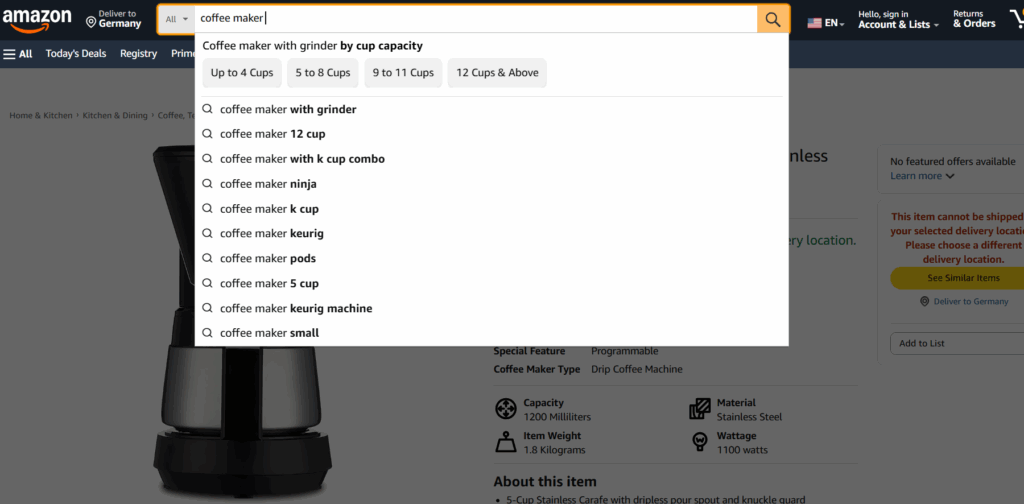
- Go to Amazon and search for your main product
- Look at the suggested searches that appear
- Scroll down and check “Related searches.”
- Write down 15-20 relevant keywords.
- Use Amazon’s keyword tool for more ideas
Product Targeting
Target specific products or categories where you want your ads to show.
Target competitor products if:
- You have a better price
- You have better reviews
- Your product has more features
- You want to steal market share
Target your own products if:
- You want to cross-sell
- You have related items
- You want to protect your listings
Step 5: Create Your Ad Images and Headlines
Make ads that look professional and get people to click.
Your Logo And Images
Your logo needs to be:
- 400×400 pixels exactly
- PNG or JPG format
- Under 5MB file size
- Clear and readable
- Your actual registered brand logo
Custom images should be:
- 1200×628 pixels
- Show your product being used
- Include people when possible
- Have good lighting
- Look professional
Image Headline Writing Tips
You get 50 characters for your headline. Make them count.
Headline Formula: [Benefit] + [Product Type] = Good Headline
- “Comfortable Running Shoes”
- “Durable Phone Cases”
- “Easy Meal Prep Tools”
Good headlines examples:
- “Comfortable Yoga Mats” (benefit-focused)
- “Premium Kitchen Tools” (quality-focused)
- “Fast Workout Results” (outcome-focused)
Bad headlines examples:
- “Best Products Ever” (too generic)
- “Amazing Quality Items” (meaningless)
- “Check Out Our Stuff” (not compelling)
How To Track Success For Amazon Sponsored Brands Ads
Only look at the right numbers and forget about the rest.
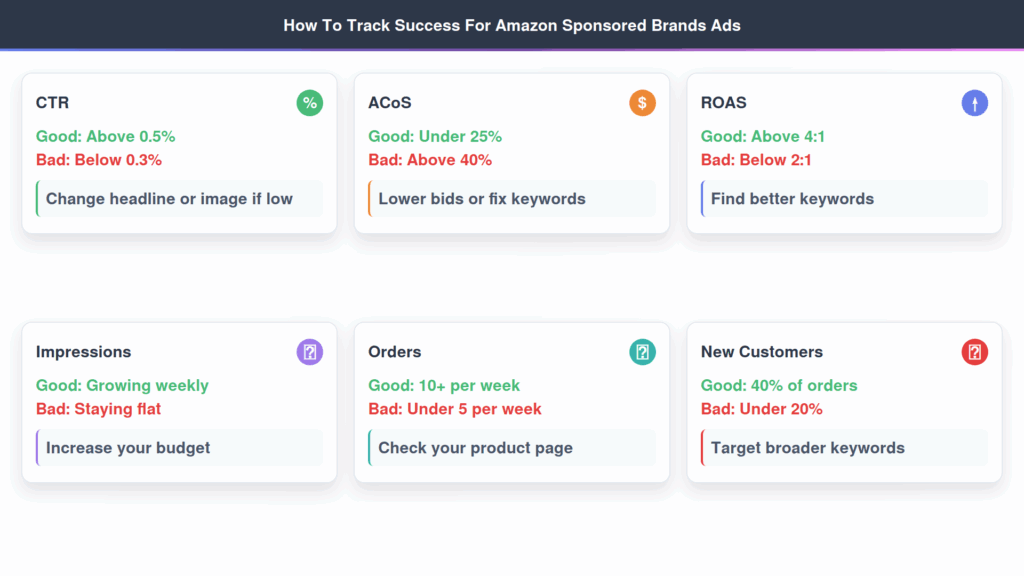
A lot of sellers check their ads every day. That is wrong. Amazon needs time to show real results, so it’s better to check once a week.
Six metrics tell you everything about your Amazon Sponsored Brands Ads campaign performance:
| Metric | What It Means | Good Number | Bad Number | What to Do |
| CTR | People are clicking your ads | Above 0.5% | Below 0.3% | Change your headline or image |
| ACoS | Ad spend vs sales | Under 25% | Above 40% | Lower bids or fix keywords |
| ROAS | Money made per dollar spent | Above 4:1 | Below 2:1 | Find better keywords |
| Impressions | People see your ads | Growing each week | Staying flat | Increase your budget |
| Orders | People buying | 10+ per week | Under 5 per week | Check your product page |
| New Customers | First-time buyers | 40% of orders | Under 20% | Target broader keywords |
CTR (Click Rate)
The CTR tells you how interesting your ad looks. So 1% CTR means that out of every 100 people who see your ad, one clicks on it.
Sponsored Brand ads on Amazon should get at least 0.5% CTR, and strong candidates get at least 1% of the vote.
If your CTR is low, your ad looks lifeless. First, try writing a title that focuses on the benefits. Then change to a picture of people using your product in their everyday lives.
ACoS (Ad Cost)
ACoS looks at how much you spend on ads and how much money you make from sales. If you spend $25 and make $100 in sales, you’ll get 25% ACoS.
Always try to keep ACoS below 25% but a result of less than 20% is great. When ACoS is high, your earnings go down and when ACoS stays above 35%, lower keyword bids by 20 to 30 percent.
ROAS (Return)
ROAS tracks how well a business makes money. ROI of 4:1 means that you spend $1 to make $4 in sales.
Try to get a 4:1 ROAS at least because campaigns that get 5:1 or more will get more money.
Amazon Sponsored Brands Ads Tools [Free And Paid]
You don’t have to manage Amazon Sponsored Brand ads all by yourself since there are tools that make everything easier and faster.
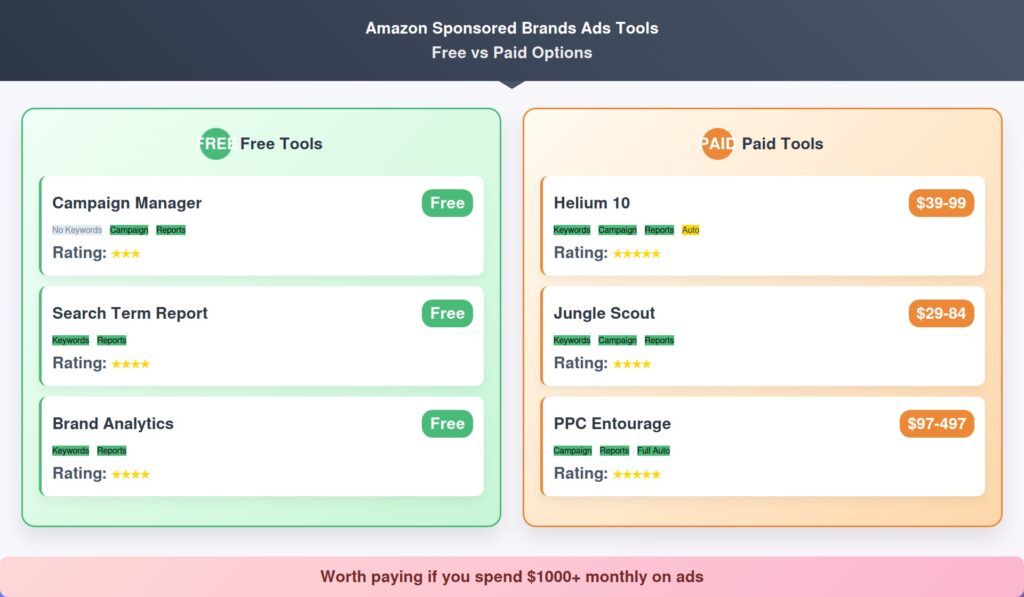
Amazon Sponsored Brands Ads Free Tools
Amazon gives you some tools right inside Seller Central.
| Tool | Cost | Keyword Research | Campaign Management | Reporting | Automation | Rating |
| Campaign Manager | Free | ❌ | ✅ | ✅ | ❌ | ⭐⭐⭐ |
| Search Term Report | Free | ✅ | ❌ | ✅ | ❌ | ⭐⭐⭐⭐ |
| Brand Analytics | Free | ✅ | ❌ | ✅ | ❌ | ⭐⭐⭐⭐ |
| Amazon Attribution | Free | ❌ | ❌ | ✅ | ❌ | ⭐⭐⭐ |
Amazon Sponsored Brands Ads Paid Tools
Paid Amazon Sponsored Brands Ads tools are expensive to use, but they help you save time. It’s worth it if you spend more than $1,000 a month on advertisements.
| Tool | Cost/Month | Keyword Research | Campaign Management | Reporting | Automation | Rating |
| Helium 10 | $39-99 | ✅ | ✅ | ✅ | ⭐⭐ | ⭐⭐⭐⭐⭐ |
| Jungle Scout | $29-84 | ✅ | ✅ | ✅ | ⭐ | ⭐⭐⭐⭐ |
| Sellics | $77-157 | ✅ | ✅ | ✅ | ⭐⭐⭐⭐ | ⭐⭐⭐⭐ |
| PPC Entourage | $97-497 | ⭐ | ✅ | ✅ | ⭐⭐⭐⭐⭐ | ⭐⭐⭐⭐⭐ |
FAQs
Your ads will start to show in 24 hours, but you won’t see real sales data for another 2 to 3 weeks. It’s best to keep things the same for 30 days.
Either your bids are too low or your daily budget ran out early. Look at your budget and put 25% more on each keyword.
Start out by using automatic bids because Amazon is better at changing bids than most people.
Spend $30 a day at first if you can. Less than $20 a day won’t give you enough information to work with.
No, you can’t run these ads without Brand Registry, and you’ll need a registered trademark first, which takes a few months to get.
Keyword targeting shows your ads when people search for specific words, but product targeting shows your ads on competitor product pages.
Your images are probably the wrong size, or your headline mentions prices. Make sure your logo is 400×400 pixels and don’t use words like “discount” in headlines.
Look at your ACoS number in the reports and try to keep it under 30%. Also, check that you’re making at least $3 for every $1 you spend on ads.

![Amazon Sponsored Brands Ads Complete 2025 Guide [Costs + Requirements]](https://eva.guru/wp-content/uploads/2024/10/brandadscover-1024x576.jpg)
